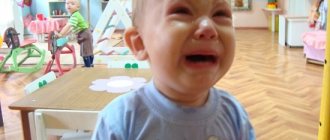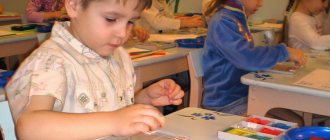Without exception, all parents are interested in the success of their child’s education. Therefore, they begin to prepare him for school in advance: they enroll future first-graders in preparatory courses, teach him reading, writing and quick counting.
Of course, these skills will be useful to the child during his studies, but mothers and fathers forget about the psychological readiness of their children for school. It is this that testifies to the sufficient maturity of the child’s psyche for the transition to a new stage of development - educational activity.
You will learn more about what psychological readiness for schooling is and why it is so important in this article.
What is psychological readiness for school?
Many parents believe that if a child has learned to read, write and solve problems by the age of seven, then he is completely ready for school.
This position is wrong. Because it is not enough for a preschooler to have a certain level of knowledge, skills and abilities in order to master the school curriculum.
By the age of seven, a child should be psychologically ready to study at school. This is the necessary level of development that will allow him to be successful not only in the learning process, but also in communicating with adults and peers, as well as in understanding the student’s internal position.
A child’s readiness to learn implies that all areas of mental development are ready to assimilate the norms and rules of school life.
Why should a preschooler be prepared for school psychologically? This is a case from practice.
At the age of 6 and a half, Pasha could read, write in block letters and knew the names of almost all dinosaurs. But the boy had difficulties with behavior: he was capricious for any reason, refused to comply with the demands of adults and constantly violated discipline. Pasha practically did not communicate with the other guys in the group; it was difficult for him to be the first to speak or invite them to play. The psychologist, examining the children’s readiness for school, informed Pasha’s mother that the child was not psychologically ready for education and recommended leaving the boy in kindergarten for another year. Mom was outraged: why did her son have a low level of readiness, because he knows and can do so many things! Without listening to the specialist’s advice, my mother sent Pasha to first grade. Almost immediately the boy began to have serious problems. The lessons were uninteresting to him, he did not listen to the teacher, looked out the window or drew on his desk. Pasha did his homework only with his mother’s help and under her strict control. A month later, the director invited my mother and recommended that Pasha be transferred to a special school because he could not cope with the curriculum.
⠀
This case illustrates how important competent psychological and pedagogical preparation for school is for later life, in which attention is paid to all aspects of the child’s mental development. Due to the mother’s wrong actions, the child ended up in a correctional school, the education in which did not correspond to his real capabilities.
Summarize. A child who is psychologically ready for school quickly adapts to the learning process and school life. It is easier for him to establish relationships with teachers and classmates, make friends and show his best qualities.
To worry less about your young schoolchild and check how the complex (and often problematic) process of adaptation to new conditions is going, use the “Where are my children” parental control application. With it you can listen to the sound around you, contact your child in any situation and watch his movements on the map.
Readiness Components
Now let's look at what a child still needs to be successful in school:
Motivational readiness
Only the work that you do with desire and interest will be successful. Therefore, by the end of preschool age, the child should have:
- desire to learn, desire to gain new knowledge;
- interest in understanding the world;
- positive attitude towards school, teacher, classmates.
Psychologists say that when children enter school, social and achievement motives prevail. They like nice uniforms, school supplies, new friends, getting good grades and being praised by the teacher.
Academic motivation appears much later, by the second or even third grade. First, the child must get used to the role of a student, and then come to an understanding of what this role can give him.
Intelligent Readiness
The more a child knows and can do, the easier it will be for him to prove himself at the beginning of school. Important readiness indicators will be:
- the ability to establish cause-and-effect relationships between events and phenomena;
- ability to analyze, generalize, draw conclusions;
- a certain amount of knowledge about the world around us within the limits of age.
Social and personal readiness
School learning involves communicating with a large number of people: teachers, classmates, children from other classes. Therefore, the child must have the following qualities well developed:
- the ability to communicate with adults and peers, both acquaintances and strangers;
- ability to comply with adult requirements;
- responsiveness, ability to sympathize, empathize;
- developed moral principles;
- adequate self-esteem.
Emotional-volitional readiness
The demands of school life are not easy for yesterday's preschooler. You need to get up early, come to school before the bell rings, and sit in class for a long time. You won't be able to relax at home either, because you have to do homework. Therefore, the child needs to be collected, responsible and organized. He will be required to:
- ability to focus on a task, concentrate attention;
- the ability to finish what you start;
- arbitrariness of behavior - the ability to manage one’s actions and emotions, restrain negative manifestations;
- the ability to overcome difficulties in achieving a goal;
- the ability to act according to the rules.
The Pasha from our story did not have formed emotional-volitional and social-personal readiness. He could not control his behavior, obey the demands of adults and interact with peers. If mom had paid due attention not only to the development of cognitive skills, perhaps everything would have turned out completely differently.
Diagnostic methods
To determine a child’s level of readiness for school, psychologists use various methods, such as the Kern-Jirasek test, “Graphic dictation,” “Conversation about school” and many others.
But parents themselves can determine how ready their child is for school.
Firstly, you can ask your son or daughter a number of questions about the world around them: “What birds do you know?”, “Tell me about the signs of spring in nature?”, “Why does water turn into ice?”
Secondly, there are quite simple methods with which mothers and fathers can find out the level of development of memory, attention and thinking in their child.
"10 words"
One of them is the “10 words” technique . Its essence is that the mother reads out 10 words that are not related to each other in meaning. The child’s task is to name all the words that he was able to remember after each repetition. The words are read 4 times. Normally, a child should remember 8-10 words after the fourth repetition. A low level of development of auditory memory is indicated by an indicator of 3 or fewer memorized words.
"Repeat the pattern"
Another technique that is quite simple for parents is “Repeat the pattern” . Mom or dad draws a simple pattern in the cells and asks the child to repeat the same one. Here you can evaluate several indicators at once: whether the child can draw lines exactly along the cells or draws crookedly, whether he gets the same pattern or whether there are differences, whether he does the task diligently or carelessly. If the pattern is drawn correctly and in straight lines, the distance between the cells is maintained - this indicates a high level of development of graphic skills and visual-spatial coordination. Otherwise, it's worth paying attention to these skills.
"The Fourth Wheel"
You can determine the level of logical thinking of a child using the “Fourth Odd One” . The child is shown 4 pictures, one of which is redundant. For example, cat-dog-cow-fox. The parent asks the child to name the extra picture and explain his choice. Out of 10 attempts, at least 7 must be scored. The result – 6 pictures or less – indicates the child’s underdevelopment of the operations of analysis and generalization. This may also indicate a low outlook.
It is useful for parents to observe their child: how he communicates with people around him, whether he has friends, whether he knows how to focus on one thing, whether he has the desire to learn something new. An important indicator is how the child copes with difficulties: gives in to them, asks for help from parents, or solves the problem himself.
Signs that a child is not ready for school
These manifestations can be noticed both before the child enters first grade and during school. A child is not ready for school if he:
- absent-minded, “with his head in the clouds”, incapable of long-term concentration;
- restless, often distracted, constantly violating discipline;
- gets tired quickly, irritable;
- cannot make friends with peers, is withdrawn or, on the contrary, constantly conflicts with them;
- does not want to go to school, complains about the “bad teacher” and “boring lessons”;
- has difficulties in mastering educational material;
- often gets sick and complains of feeling unwell;
- anxious, afraid to be the first to talk to adults.
It is important for parents to remember that by sending a psychologically unprepared child to school, they cause irreparable harm to the child’s psyche.
How to properly set up a child so that there is no bias either towards study or towards relaxation?
There are different children. There are children who came home from school, had a little rest and immediately have to do their homework. They are very responsible, they cannot do anything, relax, play while the need to do homework hangs over them. And it would be better for them to give some respite or a snack, and then immediately do their homework. According to the principle “if you’ve done the job, go for a walk.” Then they can easily engage in creativity, playing outside, physical activity, etc. And there are children who have come home and need to relax, sleep, eat, and play. And then, having rested, take on your homework. Creative expression, physical activity and play should be present
Anyway. This is what makes it possible to recover, switch, improve your mood, and release the so-called “hormones” of pleasure. Naturally, when you are in a good mood, you can quickly and easily do your homework. You just need to act based on the interests of the child.
Program
In many schools, when organizing preliminary classes for future first-graders, a psychological training program is implemented. This is an excellent bonus, since after it the child feels more comfortable in the school community and shows good educational results.
An approximate similar program “I want to study!”, designed for a year (2 hours a week), will demonstrate the plan according to which a psychologist works with future schoolchildren.
If psychological preparation is timely and competent, the child will quickly adapt to school and will be successful in learning. The opposite situation will be fraught with nervous breakdowns, the development of internal complexes and, undoubtedly, problems with academic performance.
If a child has problems in the team, will transferring them to another school solve them?
I'm actually always against running away. Because this is the position of the weak. This is a neurotic reaction. To run away is to give in, to lose. It's always being behind. This will already be a stereotype and a coping strategy for how to behave in the future. There are people who have encountered the slightest difficulties in adult life and change jobs and places of residence. For what? Why give in to someone? You need to defend your rights, your borders, your territory, and be able to defend yourself. It is correct if the child has built up his personal boundaries, managed to defend himself, and forced him to respect him. Confidence grows, and he learns to behave the same way in the future. And in the end they begin to reckon with him. Because they understand that he will not give up his territory. Why should he be a victim? Why should someone always be the commander and push? It's normal to have competition. In competition there are different means, including not very fair and not very honest. And the function of parents, psychologists, psychotherapists, psychiatrists is to teach the child to cope with this
. Through stories, through fictional and real stories, stories from literature. And there are a lot of films about this, and textbooks, and books. In such a situation, parents should think about how to solve this problem together with their child.
But sometimes there is bullying at school, the so-called mobbing and bullying
. This is when there is a strong leader who begins to put pressure, put pressure, mock, call names, and the majority, who, in order not to be in the role of a victim, join the leader or passively observe because they are afraid. After all, if the victim managed to get rid of his unseemly role, the leader will still look for another victim. That’s why they defend so little, even though they see unfair treatment on the part of the leader. An adult authoritative person, for example a class teacher, or another teacher, or a parent, or an alternative peer leader can stop bullying. Maybe the child himself, of course, if he finds the strength within himself. And he needs to be taught this.
Exercises
Home preparatory work for school involves performing exercises to develop cognitive abilities.
Development of memory and attention
Place different things on the table (preferably related to school topics - pen, notebook, pencils, album). When the child leaves the room, swap objects or remove something. When he returns, he must say what has changed.
Development of imagination
Arrange pictures on a school theme (how the hedgehog was late for class, for example). In 5 minutes, a first grader must compose a coherent story based on them.
Development of thinking
Make a series of numbers (from 10 to 25) arranged randomly. Invite your preschooler to cross out a certain number (2, for example), no matter how many times it appears.
Speech development
Have school holidays. For example, today is the ballpoint pen holiday. Tell us how it works, how it works, what functions it performs. Give her the task of composing a fairy tale about her. This way the vocabulary will be replenished and the grammatical structure of speech will develop.
Development of motivation
Read stories about how animals and children who don't go to school have a hard time in life. And vice versa - how fun and useful it is to study in it.
Doing 1-2 exercises of this kind every day is an excellent psychological preparation for school.
At what age do you start?
When should psychological preparation of a preschool child begin? Most parents are sure that a year before school. Some will doubtfully answer that a little earlier - 1.5-2 years. And everyone will probably be surprised when they hear the opinion of a child psychologist - from the cradle.
But this does not mean at all that the entire first 6 years of a preschooler’s life should consist exclusively of developmental activities and constant activities. The preparation process should be as gentle, smooth and gradual as possible. No stress or overload - otherwise by September 1, the poor first-grader will lose all desire to study.
Recommendation for parents. Every year of a preschooler’s life is marked by the development of some kind of mental accentuation. Study them. At one year, for example, you need to start actively training fine motor skills. 2 - expand your vocabulary. At 3 - introduce them to the world around them. At 4 - deal with his social adaptation. 5 - promote the development of creative potential. At 6, all this must be brought to a common denominator - psychological readiness for school.
What are your wishes and recommendations to parents?
I wish that all parents whose children are going to school would be attentive to them, help, but at the same time stimulate their independence. Because the child must and can learn and complete tasks independently. But in order to support him at the beginning of his journey, parents need to show that they are nearby, that you can always count on them. It is very important.
You can make an appointment with Anzhelika Mikhailovna or another child psychotherapist by calling the center:
+375 29 311-88-44 ; +375 33 311-01-44 ; +375 17 299-99-92 .
Or through the online registration form
on the website.








